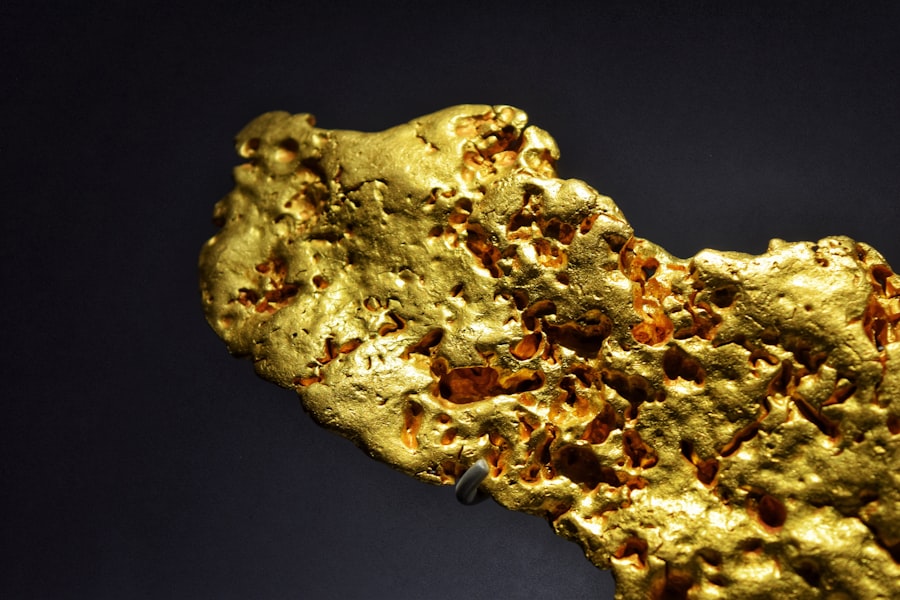Gold has played a pivotal role in the history of Africa, serving as a symbol of wealth, power, and cultural significance for centuries. The ancient kingdoms of West Africa, particularly the Mali Empire, thrived on the gold trade, which not only enriched their rulers but also facilitated the exchange of ideas and cultures across the continent and beyond. Historical accounts reveal that the legendary king Mansa Musa, who ruled in the 14th century, made a pilgrimage to Mecca that showcased his immense wealth in gold.
His journey not only highlighted the abundance of gold in Africa but also established trade routes that would connect Africa to Europe and the Middle East, fostering a rich tapestry of cultural and economic exchanges. The historical significance of African gold extends beyond mere wealth; it has shaped the political landscape of the continent. Kingdoms and empires rose and fell based on their control over gold resources.
The discovery of gold in regions such as South Africa during the 19th century led to significant migrations and conflicts, including the infamous Gold Rush that attracted fortune seekers from around the world. This influx of people and capital transformed local economies and societies, often leading to colonial exploitation and profound changes in indigenous ways of life. Thus, African gold is not just a commodity; it is a cornerstone of the continent’s historical narrative, influencing its development and interactions with the rest of the world.
Key Takeaways
- African gold has played a crucial role in shaping historical trade routes and economies.
- The gold industry significantly influences Africa’s economic growth and global trade relations.
- Cultural and artistic expressions in Africa are deeply connected to the symbolism of gold.
- Gold mining poses environmental challenges that impact sustainable development efforts.
- African gold remains a key factor in geopolitical power dynamics and international relations.
The Economic Impact of African Gold
The economic impact of African gold is profound and multifaceted, influencing both local economies and global markets. Gold mining is a significant contributor to the GDP of several African nations, providing employment opportunities for millions and generating substantial revenue through exports. Countries like Ghana, South Africa, and Tanzania have built entire industries around gold mining, with foreign investments pouring in to exploit these rich resources.
The revenue generated from gold exports often funds essential public services such as education, healthcare, and infrastructure development, thereby playing a crucial role in national economic growth. However, the economic benefits of gold mining are not uniformly distributed. While some regions experience economic booms due to gold extraction, others suffer from the adverse effects of mining activities.
The influx of wealth can lead to inflation and increased living costs, which may disproportionately affect local communities. Moreover, the reliance on gold as a primary economic driver can create vulnerabilities; fluctuations in global gold prices can have devastating effects on economies that depend heavily on this single commodity. Thus, while African gold has the potential to drive economic prosperity, it also presents challenges that require careful management and strategic planning.
African Gold and Global Trade

African gold has long been a cornerstone of global trade networks, connecting continents and facilitating economic exchanges that have shaped world history. The allure of African gold attracted traders from Europe and Asia as early as the medieval period, establishing trade routes that would become vital arteries for commerce. Today, Africa remains one of the largest producers of gold globally, with its exports playing a crucial role in international markets.
The demand for gold extends beyond jewelry; it is a critical component in electronics, aerospace, and various industrial applications, making it an essential commodity in global trade. The dynamics of global trade involving African gold are complex and often influenced by geopolitical factors. As countries seek to secure their supply chains for this precious metal, they engage in negotiations and partnerships that can shift power balances.
For instance, China has increasingly invested in African gold mining operations, seeking to bolster its own supply while providing infrastructure development in return. This interdependence highlights how African gold is not merely a local resource but a vital element in the global economy, affecting trade policies and international relations.
The Cultural Significance of African Gold
| Aspect | Description | Significance | Example |
|---|---|---|---|
| Economic Value | Gold was a major trade commodity in African empires. | Facilitated wealth accumulation and trade networks across Africa and beyond. | Mali Empire’s gold trade in Timbuktu. |
| Symbol of Power | Gold was used to signify royalty and divine authority. | Enhanced the status of kings and chiefs, reinforcing social hierarchies. | Golden regalia of Ashanti kings. |
| Religious Significance | Gold was used in religious artifacts and rituals. | Represented purity, immortality, and connection to the divine. | Gold masks and statues in Benin Kingdom. |
| Artistic Expression | Gold craftsmanship showcased advanced metallurgical skills. | Preserved cultural heritage and artistic traditions. | Gold jewelry and ornaments from the Akan people. |
| Social Status | Gold items indicated wealth and social rank. | Used as gifts and dowries, strengthening social bonds. | Gold bracelets worn by nobility in ancient Ghana. |
Gold holds immense cultural significance across various African societies, symbolizing not only wealth but also status, spirituality, and artistic expression. In many cultures, gold is intricately woven into traditional ceremonies and rituals. It is often used in adornments for weddings, funerals, and other significant life events, reflecting its role as a marker of identity and heritage.
The craftsmanship involved in creating gold jewelry and artifacts showcases the rich artistic traditions of different ethnic groups, with each piece telling a story that connects individuals to their ancestry. Moreover, gold has been a source of inspiration for artists throughout history. From intricate beadwork to elaborate sculptures, the use of gold in artistic expression transcends mere aesthetics; it embodies cultural narratives and communal values.
In contemporary times, artists continue to explore themes related to gold, addressing issues such as colonialism, exploitation, and identity through their work. This ongoing dialogue between tradition and modernity underscores the enduring significance of gold in African culture, making it a powerful medium for storytelling and social commentary.
The Environmental Impact of African Gold Mining
The environmental impact of gold mining in Africa is a pressing concern that has garnered increasing attention in recent years. While gold extraction can drive economic growth, it often comes at a significant cost to the environment. Mining activities can lead to deforestation, soil degradation, and water pollution, disrupting local ecosystems and threatening biodiversity.
The use of toxic chemicals such as cyanide in the extraction process poses serious risks to both human health and wildlife, raising ethical questions about the sustainability of these practices. Efforts to mitigate the environmental impact of gold mining are underway in various regions. Some companies are adopting more sustainable practices by implementing technologies that reduce waste and minimize ecological damage.
Additionally, there is a growing movement among local communities advocating for responsible mining practices that prioritize environmental stewardship alongside economic development. However, achieving a balance between resource extraction and environmental conservation remains a complex challenge that requires collaboration among governments, corporations, and civil society.
The Role of African Gold in International Relations

African gold plays a significant role in shaping international relations, influencing diplomatic ties and strategic partnerships between nations. As countries vie for access to Africa’s rich mineral resources, competition intensifies on the global stage. Nations with substantial investments in African gold mining often seek to strengthen their political influence through bilateral agreements and trade partnerships.
This dynamic can lead to both positive outcomes—such as infrastructure development—and negative consequences—such as exploitation or conflict over resources. Furthermore, the geopolitical significance of African gold extends beyond economic interests; it intersects with issues of security and stability within the region. Control over gold resources can exacerbate tensions between neighboring countries or fuel internal conflicts as various factions vie for dominance over lucrative mining areas.
As such, international actors must navigate these complexities carefully to promote peace and sustainable development while ensuring that local communities benefit from their natural resources.
African Gold and Wealth Inequality
The extraction of gold in Africa has often been accompanied by stark wealth inequality, raising critical questions about who truly benefits from this valuable resource.
This disparity can lead to social unrest and disillusionment among populations that feel marginalized by an industry that exploits their land without providing adequate compensation or support.
Efforts to address wealth inequality related to gold mining are gaining traction through initiatives aimed at promoting fair trade practices and corporate social responsibility. Some companies are beginning to implement programs that invest in local communities by providing education, healthcare, and infrastructure development. However, these initiatives must be sustained over time to create meaningful change.
Ultimately, addressing wealth inequality requires systemic reforms that empower local populations to participate actively in decision-making processes regarding resource management.
African Gold and Artistic Expression
Gold has long been a medium for artistic expression across Africa, serving as both a material and a symbol within various cultural contexts. From ancient times to contemporary art movements, artisans have utilized gold to create intricate jewelry, ceremonial objects, and decorative pieces that reflect their cultural heritage. The craftsmanship involved in these creations often embodies deep spiritual meanings or historical narratives that connect individuals to their ancestry.
In modern times, artists continue to explore themes related to gold through diverse mediums such as painting, sculpture, and installation art. Many contemporary artists use gold not only for its aesthetic appeal but also as a commentary on issues such as colonialism, exploitation, and identity politics. By incorporating gold into their work, these artists challenge viewers to reconsider their perceptions of wealth and value while highlighting the complex relationship between art and commerce in today’s globalized world.
The Future of African Gold Mining
The future of African gold mining is poised at a crossroads marked by both challenges and opportunities. As global demand for gold continues to fluctuate due to economic uncertainties and changing consumer preferences, mining companies must adapt their strategies accordingly. Innovations in technology may play a crucial role in shaping the industry’s future by improving efficiency while minimizing environmental impact.
Sustainable mining practices are becoming increasingly important as stakeholders recognize the need for responsible resource management. Moreover, there is potential for greater collaboration between governments, local communities, and mining companies to ensure that the benefits of gold extraction are equitably shared. By prioritizing transparency and accountability within the industry, stakeholders can work together to create a more sustainable future for African gold mining—one that respects both people and the planet.
African Gold and Sustainable Development
Sustainable development is an essential consideration for the future of African gold mining as stakeholders grapple with balancing economic growth with environmental protection and social equity. The integration of sustainable practices into mining operations can help mitigate negative impacts while promoting long-term benefits for local communities. This includes investing in renewable energy sources for mining operations or implementing waste management systems that reduce pollution.
Furthermore, sustainable development initiatives can empower local populations by providing them with opportunities for participation in decision-making processes related to resource management. By fostering inclusive governance structures that prioritize community needs alongside corporate interests, stakeholders can work towards creating an equitable framework for managing Africa’s rich mineral resources—ensuring that future generations benefit from these invaluable assets.
African Gold and Geopolitical Power
African gold holds significant geopolitical power as nations recognize its strategic importance within global markets. Countries rich in gold resources often find themselves at the center of international negotiations aimed at securing access to these valuable commodities. This dynamic can lead to shifts in alliances as nations seek partnerships that enhance their economic standing while navigating complex geopolitical landscapes.
Moreover, control over gold resources can influence regional stability; nations with abundant reserves may wield greater influence on the global stage while those lacking such resources may find themselves at a disadvantage. As competition intensifies among global powers seeking access to Africa’s mineral wealth continues unabated—understanding how these dynamics shape international relations will be crucial for policymakers aiming to promote peace and prosperity across the continent. In conclusion, African gold is not merely a commodity; it is deeply intertwined with historical narratives, economic realities, cultural expressions, environmental considerations, international relations dynamics—and much more—making it an essential element within both local contexts and global frameworks alike.
African gold plays a crucial role in the global economy, not only due to its significant contribution to the jewelry and electronics industries but also because of its impact on international trade and investment. The strategic importance of African gold is highlighted in various discussions, including an insightful article on the topic found at In the War Room. This article delves into the geopolitical implications of gold mining in Africa and how it shapes global markets, making it essential reading for anyone interested in understanding the broader significance of this precious resource.
WATCH THIS! The Secret War for Africa’s Gold: How Private Armies Fund Global Conflict
FAQs
What is the significance of African gold in the global market?
African gold is a major contributor to the global gold supply, with countries like South Africa, Ghana, and Mali being some of the top producers. Its significance lies in its role in international trade, investment, and as a reserve asset for central banks worldwide.
Which African countries are the largest producers of gold?
The largest gold producers in Africa include South Africa, Ghana, Mali, Tanzania, and Burkina Faso. These countries have extensive mining operations and contribute significantly to the continent’s gold output.
How does African gold impact the global economy?
African gold impacts the global economy by influencing gold prices, supporting mining industries, creating jobs, and generating export revenues for African countries. It also plays a role in investment portfolios and central bank reserves globally.
What are the uses of gold sourced from Africa?
Gold from Africa is used in various sectors including jewelry manufacturing, electronics, dentistry, and as a form of investment through bullion and coins. It is also important for central banks as part of their foreign exchange reserves.
How does gold mining affect African communities?
Gold mining can provide employment and infrastructure development in African communities. However, it can also pose environmental challenges and social issues if not managed responsibly, including land degradation and displacement.
What role does African gold play in global supply chains?
African gold is a critical raw material in global supply chains, especially for industries requiring high-quality gold. It supports manufacturing and trade networks worldwide, linking African economies to global markets.
Are there any ethical concerns related to African gold mining?
Yes, ethical concerns include illegal mining, child labor, poor working conditions, and environmental degradation. Efforts are ongoing to promote responsible mining practices and certification schemes to ensure ethical sourcing.
How does the price of gold affect African economies?
Fluctuations in gold prices can significantly impact African economies that rely on gold exports. Higher prices can boost revenues and economic growth, while lower prices may reduce income and affect government budgets.
What measures are in place to ensure sustainable gold mining in Africa?
Sustainable mining initiatives include regulatory frameworks, environmental impact assessments, community engagement, and adherence to international standards such as the Responsible Gold Mining Principles and the Kimberley Process.
Why is African gold important for investors?
African gold is important for investors as it represents a substantial portion of the global gold supply, offering opportunities for diversification and exposure to emerging markets. The continent’s gold reserves also contribute to the stability and availability of gold worldwide.



